VI Mythologies
For many readers Greek Mythology is harmless children’s stuff, a colorful archive of fanciful characters and plots, entertainment for young people, a ready-made source of images and plots for writers, and for many proof of a degree of literacy. In the 1970’s and 1980’s, however feminist critiques of Western culture and Western religion, as well as renewed interest in prehellenic cultures, brought new ways of reading and understanding these old familiar stories.
Gorgons
Perhaps nothing illustrates this new understanding so well as stories of the fierce female monsters, the Gorgons, sacred images guarding the old goddess shrines from intruders, worn by priestesses as masks to repel attackers. Their terrifying staring eyes can turn a man to stone. They have snakes for hair and a protruding tongue. Their images can be found as early as the fifteenth century on Crete, resisting any fairytale magic that might render them harmless, leaving an undermining subtext beneath the imposed harmonies of the Greco-Christian West.
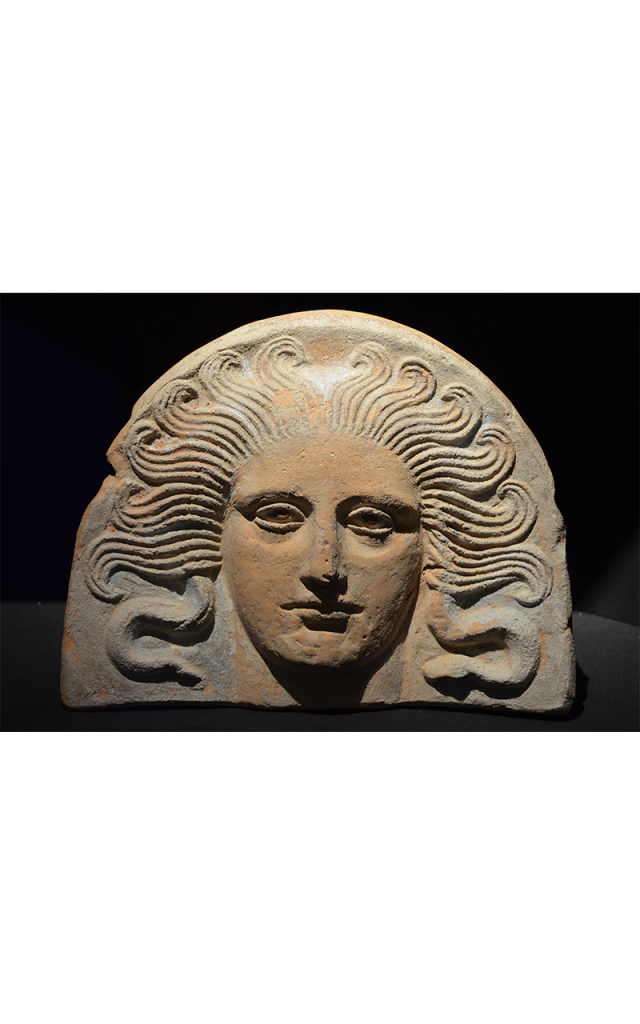 In this soft summer
In this soft summer
Drinking the emerald grass
With sated peonies
Walking with measured step
Tum, tum, ta tum.
Birds twitter, children belie
Death, perfidy timbre
In the bird bones
A slow andante
Steadied in the marrow.
Tum, tum, ta, tum
Keep the step
Smile gravely as they pass
Mourn the dead, so peaceful
Christen the innocents, so sweet
In this Apollonian age
Liturgy flutters, leafy
Illuminated shadows, gold-brushed
Vestments bloom
In miraculous rotation.
Hear that, I will not hear it,
That alien step on dappled lawn.
Speak softly here. Watch
You will break it—
Opens like a mouth.
In obstinate interference
Tearing at the grass.
I cannot hear, She is laughing
Her tongue is protrudes, she has claws
Scratches like a cat–
There is no health in us—
How it crackles and rattles
Mocks the logic of patrimony
The children stand like statues
Facing the other way.
Now we hear it in the grass
Like the angry buzz of wasps
Swollen and sick.
Or the scream of tires
In sulfurous air
The peonies lay strangled
Drinking poison from the grass
Their petals rot and liquefy
Seep onto the grass
The grass is bottle green.
Medusa
The most familiar of the Gorgons is perhaps Medusa, killed by the Greek hero Perseus in a glory tale of decapitation. Protecting himself from the stare of Gorgon eyes that can turn a man to stone, looking only at the head’s reflection on a shield given to him by Athena, Perseus manages to cut off Medusa’s head, cram it in his pack and carry it away to using it for his own purposes, quelling monsters and challengers. Eventually, he would give it as a trophy to Athena,, daughter of Zeus, to carry on her shield as testimony to the triumph of manly Greek courage over barbarian obscenity
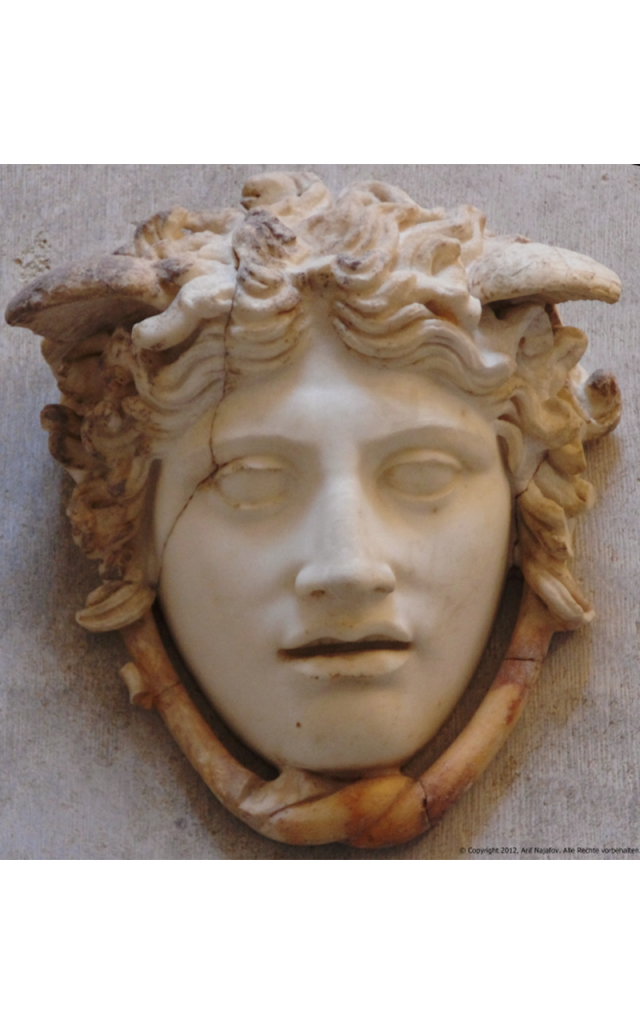 Socks, no ankles,
Socks, no ankles,
And a black face
That sprouts up hair
Slick ringlets pink
Plastic rolled.
The features hard
On a protruding tongue
Wise staring eyes
Take what they see
And fix it in stone.
Try not to look
My high-born lovely
With your smile tightening
Around the slender flute
Cradled in your lap.
But the image remains
gaping magenta blouse
button loose, serpent hair
like a specter captured
On your pursed lips.
Flayed from living flesh
A hairy pelt and a grimace
ringed with curls make
A talisman picture
Snapped at the neck.
Andromeda and Cassiopeia
Perhaps no mythic story yields better visual images than that of the beautiful maiden Andromeda, shackled naked to a rock in the middle of the ocean, sacrifice to the powerful god of the sea Poseidon, who sent tidal waves and floods to threaten Andromeda’s father’s kingdom, The hero Perseus passes by the rock, sees Andromeda. Given a promise from her parents that they can marry, he uses the power of the severed Medusa head to fend off sea monsters and carry her away, only to have to fight off a more prestigious suitor brought in by Andromeda’s treacherous mother Cassiopeia, who had caused the trouble in the first place by boasting of her daughter’s beauty. Perseus and Andromeda marry, Cassiopeia is punished, given a humiliating place in the heavens tied upside down in a market basket.
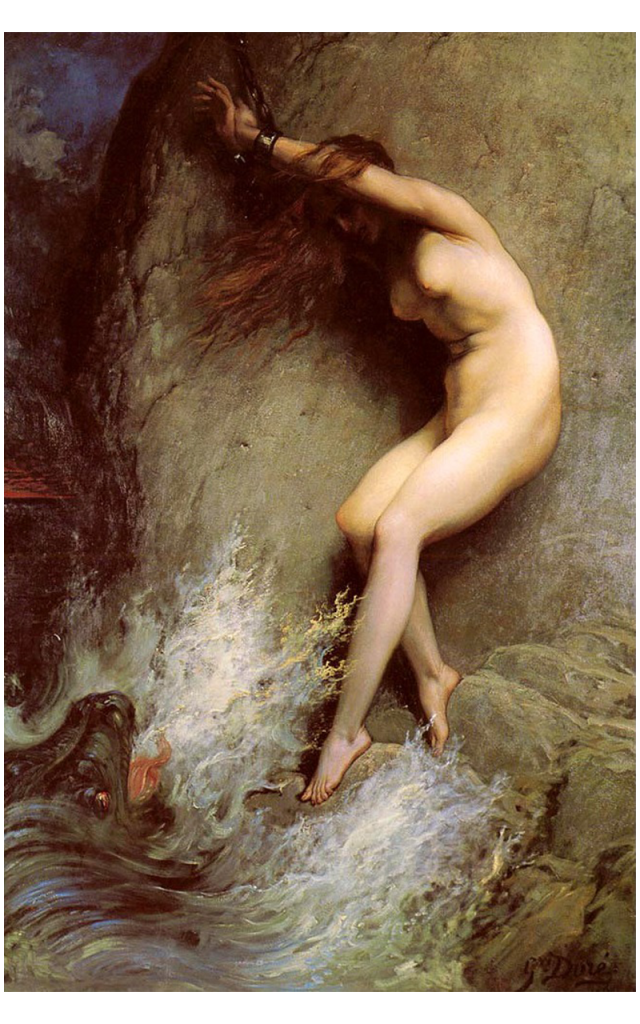 I Starry Sky
I Starry Sky
Two grey wrens rhyme on the snow
Not meaning to ignore
On evening’s egg shell curve
The lesson of Cassiopeia’s disgrace
High in the lemon loop of the sky
Eastward to its rose compliment.
Her turned ambition dwindles
Dusty purple as the corners
Bruise toward regret, and absence
Spreads black arms through
The pinprick pain of stars
Below: a few feathers, a kernel of grain.
II Domestic Scene
Andromeda did not love him
What woman can love her rescuer
Or admire all that flailing
\Around with a bloody head
Just so you see the muscles
In the fine lines of a hero’s body
Instead the modest rolling sable
Of dutiful marriage
Cemented by staring eyes
Catches her crying and forgiven
Resigned to motherhood
Now it’s “Nagg wants his pap”
And the sand in the basket
Needs changing, so broad the stroke
She has forgotten even
The sweetness of revenge.
III Still Life
A mantel skewed cubist style
Its depth flattened
In favor of a yellowed print
Tinted pale aqua ad rose,
A curl of baby hair, a bit of lace
Around the wicker frame
Such a sweet child, but
When daughters marry
Foreign adventurers
The color is brown.
IV Landscape
Sea a blue-green froth
Clouds by turner
Grander than the earth.
A human figure, almost
Lost, a blurred grey
Point of calm in chaos.
Victim of a revengeful order
Standing naked but for
The white pin-prick
Of flickering jewels.
Do you see her still there
On the left, her hair
Drifting in the wind.
Metis
Zeus had no need for severed heads. Changing at will into a bull, a bird of prey, and even on one occasion a “shower of golden rain” he raped women and on occasion boys at will. Few of his adventures were as dramatic as that involving Metis, the female personification of abstract thought and strategic cleverness called “intelligence.” After forcing her to marry him, there came a prophecy. Metis would give birth to a son more powerful than he was himself, Immediately Zeus swallowed her up incorporating her into himself so as to forestall the birth.. Soon, however, he suffered a raging headache. It turned out that Metis was already pregnant, and her daughter Athena was born from Zeus’s forehead..
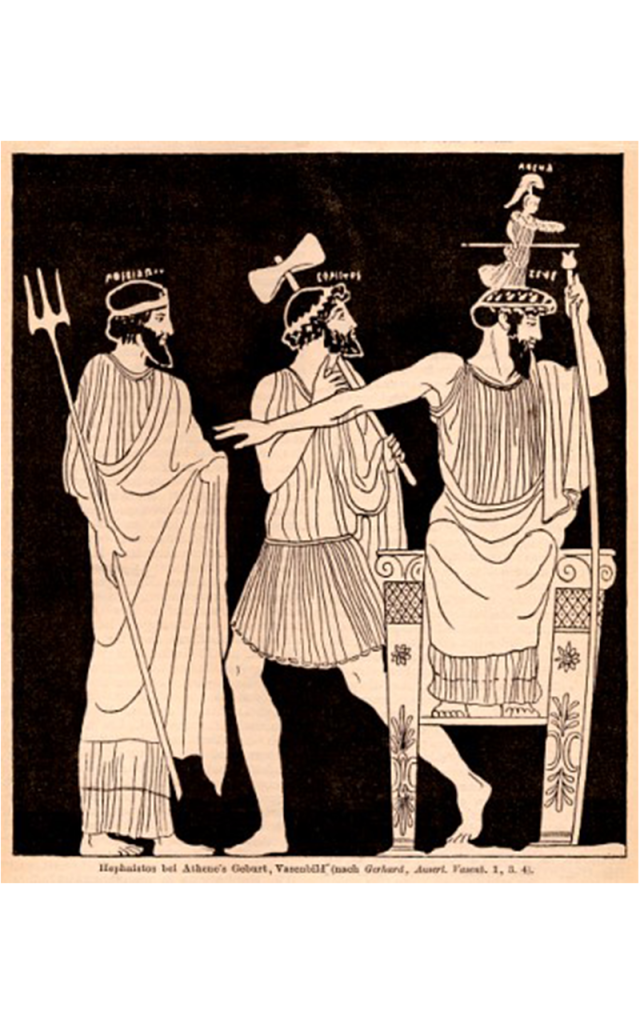 I Seduction
I Seduction
It made him think to capture her,
The precise mesh of binary bronze
Shine as gossamer clasped and shimmering
Around her slim waist, lark eyes fixed
Unblinking as the precious gold drew
On her skin the cross of patronage.
Thinking her lovely but dangerous
He would have her anyway and married
first with force and then with gold
set with amethyst, to secure her counsel
Ringed by his majesty. When they slept
together secretly she would whisper it.
She was less than him, he thought,
unarmed, lovely but dangerous,
Never did he doubt his thinking
could swallow the curve of her progress
through the shrine, tangling lines of future’s
Blue lavender dance over the wilting dead
The lilies seed mouth that could not be
Imitated the way his lightening drew
Crosses on captured ground.
II Marriage
As he swallowed he dreamt the pistils’
Inarticulate bulge, the pendulous corolla
And the fetus resting curled in the womb
Drew them tight in a spiral calculus that
That instructed the multiplying cells
In patterns he imagined against the night sky.
He understood finally the two of them,
She and the girl born months too early.
For it could not have been a boy, not
When they planned it all together,
Still, he suspected, conspired, whispering
On the landing when he went to lock the door
Because they chose not to see, not to acknowledge
The advantages his protection offered them
But plotted and concocted in their insidious ways
When he hoped for, no rather expected, service.
She had the brat whom he accepted as his
They would kill him yet, banging the pots
Until his head burst with it, burst with their
Shrill laughter inside his head , a son would
Never have plagued him so. It was a daughter’s
Voice he heard, pressing against the backs of his eyes
Throbbing their melody through the logarithmic
Lines of his intelligence and his authority.
III Athena
Three times she had denied the old woman
Making it clear at last whose daughter she would be
Though still the old one worried their thoughts,
Shriveled, speechless running the water for the tea
No one wanted, even after she had crashed out of the house
Screaming that it did not matter what either of them thought
She would do as she wished and did. Afterwards
It would surprise him to see how much like a son she was
Father and daughter, home from the counsel, count the votes
Metis sits by the fire, fat burning from her bird bones,
dead in all but name, with the warp on rhetoric’s
sterile womb weaving the faint outline of another birth.
He waited. Through other women, other wives
Even the priest said that it was he who had gotten
The woman pregnant so there had been no transgression
She was his and though there might have been some abuse
Hail Mary forgiveness was accessible and quick.
Narcissus
In his Metamorphoses Ovid tells the story of the beautiful youth Narcissus who, in love with his own reflection glimpsed in a mountain pool, cruelly refuses his many lovers. Briefly consoled by the nymph Echo repeating his anguished cries,he futilely tries and tries again to embrace his own image in the water,
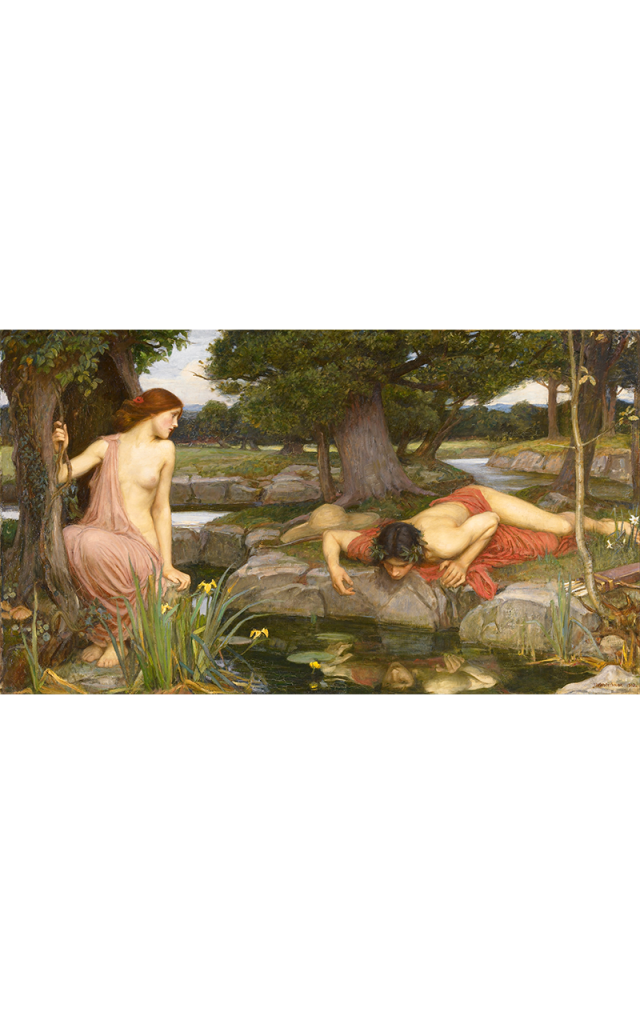 .
.
A proper husband never welcomed
By his doll wife except in mimicry
What mirror let you dream an animus so pure
That only a clone could aspire to love?
No doubt some woman thought beauty better
Disarmed and brought you to that spring
Untouched by thirsty deer or fallen leaves
What a marriage self-love makes
Where nothing stops a god’s blank coitus
With formula and check.
Still because of her no one else
Need take your narcotic glance.
Eurydice
Emblematic of the Minoan snake deity of the Underworld, Eurydice represented both prophetic insight and rebirth. Constantly retold is the story of the hero Orpheus’s failed attempt to bring her up into the light of Apollo the sun-god.
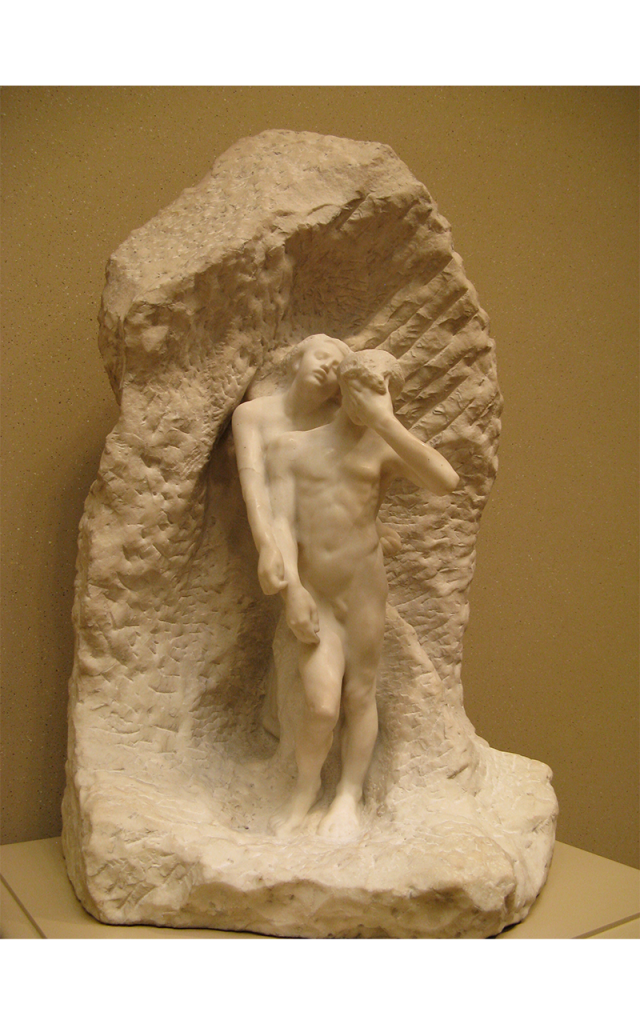 Here it is again that thinnest of melodies—
Here it is again that thinnest of melodies—
Glitter threaded through night’s serge only to be extinguished.
No there, where the ear is turned, old pinprick
With his flute tongue and gaggle of followers
Plagues me still, threading melody through the nerve
With a sliver of gold I can only dread when the burst juice
of pomegranate. warms as it finds the vein.
Not surprising that I would dream, a common complaint
But sweeter still to drink thick red Lethe’s breath
Riding the omphalos wrapped in its black phial.
Oh, but I long for the sun. And I do hear it
Listen (standing now, shaking her head against the drug
His voice like spring water on flower petals)
He is waiting, just beyond the turn, only to go
Yes, to go, hear it louder now. She is running
Bare feet on the stairs, hearing him moving above
His song peeling serpents from her neck,
Scarves from her waist, skin ready for the sun.
Higher she climbs (now the light above)
Almost to the top step, stumbling at the last.
But just as her eyes flame, he turns around. Hand
Still on the strings, he gives a proprietary nod
While around his neck coils the bleached shell of her
Old skin, all crimped and yellowed, Raising her hand
As if for one last moment to pull it to her
She falls back into oblivion.
Orpheus
After this failure Orpheus is set upon by Maenads, who resent his failure to honor the old fertility and agricultural deities of the earth. Devoured and torn apart, what remains of him descends back into the Underworld..
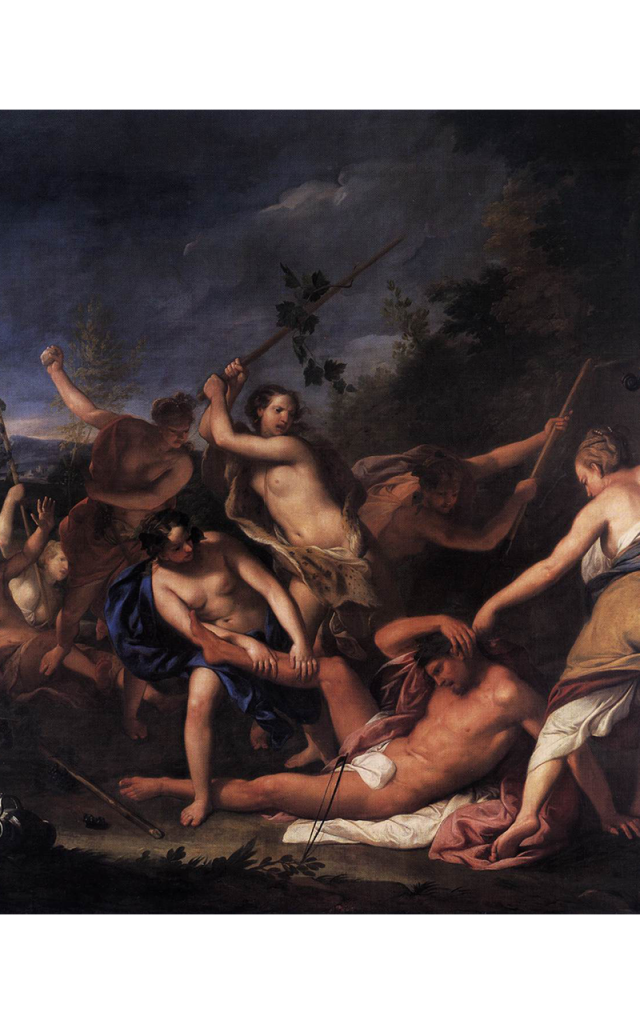 Oiled olives piled in tubs
Oiled olives piled in tubs
The women swarm in on the sparkle
Shining their fingers at the blackened suns
Sorting the most succulent for winter pleasure-
They have you now, my Thracian hero
Plowing and planting in the cool Aegean dawn
Tomorrow will carry your black
Head off, blowing like a trumpet
Push all your smooth songs out.
There in the dust are your songs.
Listen as they pit you, a slice
Down into the flesh they share
Breaks the answering hiss of
A viper coiled in the grass,
An easy shovel length away.
No singing now, and no one
Following up dark passages,
Oh what a god you thought yourself
Leading her up through despair
When you should have known ownership
Can break the spell of any love—
No fear, they will let you have her
So close you are to the mystery.
Hygieia
Hygieia, female aspect of the Greek deity of medicine, represented health and wholeness. .
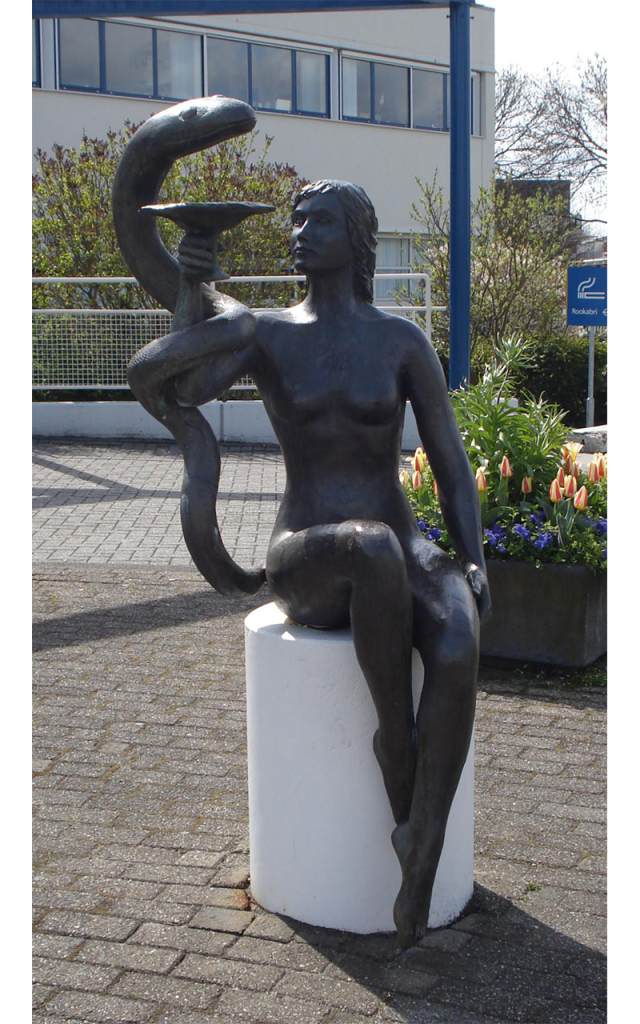 No one will fill that single hollow
No one will fill that single hollow
I smooth so carefully each morning.
Beware, Pythagoras said
The imprint of your body on a bed
Lest it be stolen from you,
That traced negative waking
The aperture of flesh to its
taking speed, its printed exposure.
Each midnight I reach to a
Melodious hollow close by my ear
Follow the secret curve of my own breath
The rhythms of my innermost heart ,
Tracing a writing that is the shadow
Of its own grace.
All text and poetry copyright Andrea Nye 2021
Image Credits in order of appearance:
Carole Raddato from FRANKFURT, Germany, CC BY-SA 2.0, via Wikimedia Commons
Glyptothek, CC BY-SA 3.0, via Wikimedia Commons
Gustave Doré, Public domain, via Wikimedia Commons
Unknown authorUnknown author, Public domain, via Wikimedia Commons
John William Waterhouse, Public domain, via Wikimedia Commons
Yair-haklai, CC BY-SA 3.0, via Wikimedia Commons
Gregorio Lazzarini, Public domain, via Wikimedia Commons
Wikifrits, CC BY-SA 3.0, via Wikimedia Commons